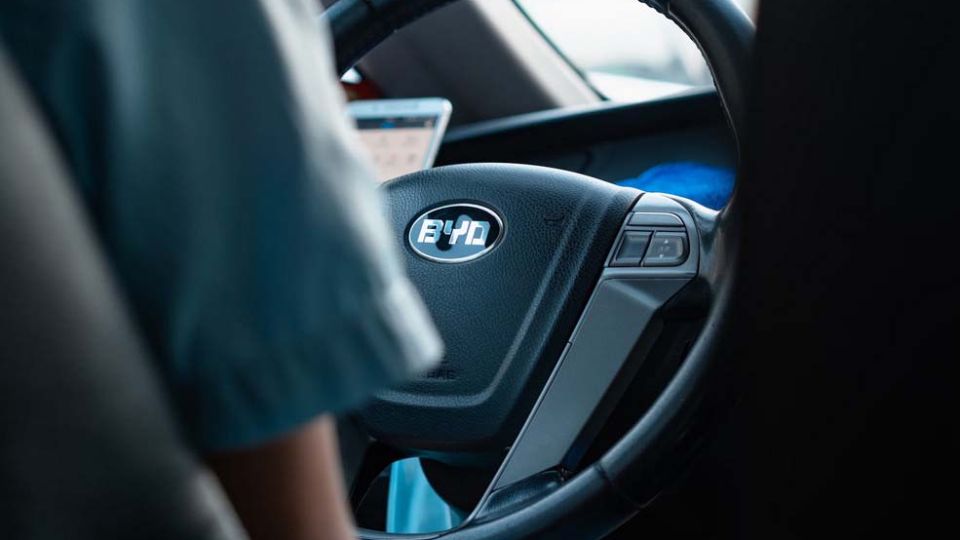July 22, 2024
JAKARTA – The government has reaffirmed BYD’s plan to build an electric vehicle (EV) factory in Indonesia after the Chinese automaker completed building its first Southeast Asian facility in Thailand.
Rachmat Kaimuddin, transportation and infrastructure undersecretary at the Office of the Coordinating Maritime Affairs and Investment Minister, said BYD was obligated to build its local factory as stipulated in Presidential Regulation No. 79/2023, and that the government had implemented a mechanism to ensure it followed through on its commitments.
“It’s not just promises, we hold [the company’s] guarantee in a bank,” he told The Jakarta Post on July 15.
BYD opened its first regional EV plant in Thailand on July 4, roughly two years after announcing its plan to build a factory in that country as part of a wave of Chinese EV investments worth more than US$1.44 billion, helped by subsidies and tax incentives from the Thai government.
Read also: China’s BYD opens EV factory in Thailand, first in Southeast Asia
The Chinese EV maker also plans to build a factory in Vietnam, but its local partner said in March that progress had slowed due to the lagging EV market.
Rachmat also made reassurances that the government had learned from Thailand’s initiative.
The 2023 presidential regulation grants tax incentives, including exemptions on import duty and luxury tax, to eligible EV manufacturers until 2025. The scheme allows foreign carmakers to import completely built-up (CBU) cars so they introduce their products to the Indonesian market before kicking domestic production into high gear.
The government has also eased its local content requirements for EV carmakers to meet the minimum 40 percent of domestically sourced components by extending the time frame from 2023 previously to 2026.
“But these companies must produce the same number of cars domestically [compared to imports] until 2027,” Rachmat said, underlining that the engines and batteries of the locally made cars would be of the same quality, if not better.
To ensure EV manufacturers keep their word, the government requires a deposit equivalent to 72.5 percent of the imported car’s value by cost, insurance and freight (CIF).
Earlier in March, Rachmat said banks could liquefy a carmaker’s investment guarantee proportionate to the number of cars yet to be produced by the end of 2027, Bloomberg Technoz reported.
He also explained that only a limited volume of imported CBU cars would benefit from the scheme during the initial time period, and that a potential extension would be dependent on the investment realized.
Read also: Indonesia relaxes tax rules on EV imports to attract investment
As of June, only BYD and French automaker Citroën are eligible for exemptions from import duty and luxury tax, according to the Industry Ministry.
Meanwhile, BYD told the Post on Saturday that construction would commence on its factory in Subang, West Java, as announced in January.
Asked how its Indonesian facility might differ from its factory in Thailand, the carmaker said the models it produced domestically would be based on the preference of local customers. It also pointed to certain challenges, including the more competitive EV market and the lack of a charging infrastructure in Indonesia.
The nationwide EV wholesale figure, or direct sales from factories to dealers, totaled 11,940 units in the first six months of 2024, up from 5,845 units in the same period last year, according to data from the Association of Indonesian Automotive Manufacturers (Gaikindo).
Citroën president director Tan Kim Piauw said on Thursday that the company was slated to begin mass-producing its e-C3 all-electric SUV in August at the assembly plant of Indomobil Group in Purwakarta, West Java.
“When local production has begun […] we can stop CBU imports by 100 percent,” Tan said during the ongoing Gaikindo Indonesia International Auto Show (GIIAS), which runs until July 28 at the Indonesia Convention Exhibition in Tangerang, Banten.
Meanwhile, Chinese automaker Chery, which is marketing its Omoda E5 with a lithium iron phosphate (LFP) battery, plans to use locally made EV batteries by 2026.
Batteries contribute between 30 and 40 percent of an electric car’s total value, and sourcing the component domestically could help the company comply with the local content policy.
“Chery is planning to use local batteries in the future. However, we have yet to determine the supplier,” Chery Sales Indonesia marketing head M. Ilham Pratama said on July 15, as quoted by Bisnis.com.


